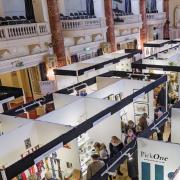Gloucester Rugby CEO Stephen Vaughan has had a meteoric rise to fame. From playing professional football in the Black Country as a teenager to a stint as an Club 18-30 rep, he, in the blink of an eye, found himself Managing Director of the London 2012 Olympics. And with his move to Kingsholm, his career might actually have come full-circle

In many ways, it’s a great irony that Stephen Vaughan has ended up in the CEO’s chair at Gloucester Rugby.
As a teenager it was football all the way - playing for Walsall FC in the FA Youth Trophy against Manchester United greats like David Beckham and Ryan Giggs.
Growing up in Birmingham in a big Irish family, he was a Moseley supporter and played county sport, but had to make a decision at the end of his school life: university or football. Football won.
On paper, considering where he is now, it’s slightly surprising.
But in the flesh, you can see why this “young, skinny upstart” - as he describes himself - could only ever have ploughed his own furrow.
He’s not a man to be persuaded to do anything he doesn’t want to.
When I meet him in his office at Kingsholm - a modest room on the same corridor as his staff - he’s wearing chinos and blue suede shoes.
I don’t know why, but I’m slightly disarmed that he’s not in a suit. And then it becomes abundantly clear why he isn’t. He doesn’t want to, nor does he need to.
Famous for preferring to watch Gloucester from the Shed rather than the lofty corporate boxes, Stephen is not your average CEO.

For a start, he donates his coffee to me.
“Sorry,” he says, phone in hand as he rings someone to make me one. “They’re not picking up. You’ll have to have mine.”
And so he plonks it down in front of me - the corporate equivalent of his last rolo.
Stephen has a formidable focus about him, a relentless clarity of vision hidden under a cloak of easy Brummie charm, approachability and a lot of jokes.
Stephen started at Walsall under the then Tory government’s Youth Training Scheme - launched in the 80s as a counter to the lack of apprenticeships and soaring youth unemployment.
The Saddlers certainly gave him his work ethic - an unstoppable juggernaut which has propelled him to the top of his game.
On a salary of £29.50 a week, he had to take two buses and a train every day to get to the club.
“You cleaned boots, you cleaned changing rooms, you swept terraces and every now and then you’d kick a ball,” he says.
“I had some of the best times, but I was a young lad out of school and suddenly I was in a different environment and it was sink or swim.
“From being the best player everywhere you’d been, suddenly I was this young, skinny upstart.
“We were going to college with lads from Aston Villa and Wolverhampton Wanderers, and they were getting all the latest energy drinks and kit and we were having to bring our own sandwiches and wash our own stuff. It was a real learning curve.”
After a year, he was given an apprenticeship and a pay rise of a fiver, which he says he didn’t know what to do with. By the age of 17, he was captain, with Beckham’s number on his back.
“I started to play at some amazing stadiums,” he says. “Old Trafford and Villa Park, and we played away against Chelsea. In pride of place in my mum’s house is a programme from when we played Manchester United at Old Trafford for the FA Youth Cup.
“I was playing the same number as David Beckham, but you never knew who he was then. In that team there was Ryan Giggs - who was the only one anyone had heard of - Beckham, Paul Scholes, Nicky Butt, the Neville brothers, Robbie Savage, so I had a wonderful time.”
A change of manager meant he shipped out to non-league Stourbridge, watched by several professional clubs, but nothing came of it.
“For the first time in my life I found myself not working and with time on my hands, and I didn’t like it,” he says.
“So I applied for everything. The most soul-destroying day I had was when I applied for a dental assistant role and was told I didn’t have the qualifications.
“I was absolutely gutted. Back then, at the end of you’re playing career, you might have been revered, but you didn’t have the skills set to transfer. I had nothing to fall back on.
“I’m not very good at not doing things. I have to be working all the time.”
He was “poked with a stick” by his family to take a job Land Rover in Solihull, working on the track on the new Discovery.
“It was so not me,” he says. “It broke me. The guys were great and they wanted to put me on courses to drive me up through the ranks.
“But when you had to press a buzzer and put your hand up if you wanted to go to the toilet, or when the light went off, it meant you could go for food….
“The bit that got me was, looking around and seeing how many people were so happy to work there.
“It was a job for life and so people would have their two weeks’ holiday at factory closing, every year, same two weeks, and it was against my every whim to be so prescribed.
“I’d gone from doing what I really loved to being paid handsomely but I couldn’t look at myself in the mirror.”
And then his big break came, courtesy of his sister Sarah, who, seeing him so miserable, applied for several club rep jobs on his behalf. He got all of them.
Thanks to a Brummie rendition of Barry Manilow’s Copa Cabana in a “wild” interview, Club 18-30 sent him to Corfu.
“I grew up extremely quickly and happened to do quite well in my first year,” says Stephen, with trademark modesty.
In his second year, at 20, he became the youngest rep to be given a resort - and suddenly, he found his calling.
“I became interested in management, the contracting, dealing with hotels, hoteliers, dealing with the resort venues and coach drivers,” he says.
“It became obvious quite quickly that being a rep wasn’t my calling, but the organisation, the management, was.”
When Thomas Cook bought the brand, he ran its mainline programme and youth brands, and from there, became commercial director.
Next stop was head of worldwide sales for Thomas Cook’s independent brands. It’s this, he says, which led him into “dynamic packaging”.
When EasyJet and Ryanair came into the market, he had his lightbulb moment.
He threw out the prescribed flight times and locations which had hamstrung holiday companies for decades and built a platform which allowed Thomas Cook to use these new airlines’ flights, add a commission and ATOL-bond it to offer holiday-makers a safety net. Holiday-makers could travel where they wanted, when they wanted.
The changes he made were seismic. They have altered the way the UK masses travel - for good.
And yet, he brushes over it as if it was a decision about which shirt to wear. No big deal. Just something else he sorted.
“We went from 2,000 passengers to 110,000 overnight,” he says.
“And then I got asked to be MD of Club 18-30 and the youth brands, to work out whether we continued or didn’t.
“It was dying and we needed to reinvent ourselves.
“We went away from awful advertising campaigns that said Wake up at the crack of Dawn…or Lisa….or Karen. Or Beaver Espana. Honestly, it was awful.
“And so we repositioned it from this kiss-me-quick, squeeze-me-slow naff to cool and classy. We called it Love 18-30.
“I turned it from a £1 million loss to a £3 million profit in three years.”
And this is where the precision vision with which he attacks every project, is writ large.
“We were very clear with staff. We told them, ‘You’re hard-sell, sleazy, a bit grubby.
“We introduced sackable offences, like being drunk on excursions or swearing into microphones.
“And we lost a lot of people. But recruitment tripled and we won a prestigious marketing award, and different sponsors and brands started associating with us.
“Until you get rid of the bottle of gin in the airing cupboard, you’re not going to get rid of your alcohol problem, are you?”
After a decade, he was looking to leave.
Thomas Cook wouldn’t let him, and they handed him the keys to the MD’s office and a £40m ticketing deal organising breaks to the 2012 London Olympics.
“We had to set up a secret location in North London where we kept millions of pounds worth of stock,” he says with boyish glee.
“It’s location was incredible. When you went in it was retina recognition, passport, the whole shooting match - you couldn’t take anything in or take anything out.
“It was proper James Bond stuff.
“That was really interesting, and as managing director, my skills set had to catch up really quickly. I was suddenly dealing with clients from Korea, from Japan and China, North America, Canada, Brazil, Russia, large corporations like Samsung, Lloyds, Cadbury’s, Adidas. It was brilliant in terms of growth, but it was very stressful, because if ever there was a project that wasn’t going to change, that opening ceremony was not going to move dates.”
After the Games, Thomas Cook wanted him to go back into the main business; he didn’t.
Emirates approached him, as did a football team whose name he declines to mention, and another unnamed company in the US. But he was desperate to come home.
“As wonderful as these things sound, you’re living out of suitcases.
“I then got approached by someone around the job at Gloucester. I’ve always liked rugby, I’ve always known Gloucester as being a good club, a big club with lots of tradition and history.”
Stephen’s mum married a Fairford man and his grandmother is, as Stephen says “the biggest Gloucester supporter ever”.
“We joke, we call her the Director of Rugby. Whenever we lose, I get the phone call.”
While Club 18-30 was out with the old, in with the new, all change, change, change, Stephen knew top-flight rugby was a different animal.
He looked at clubs like Northampton, clubs which had retained their core team of coaching staff for some years, and he vowed stability.
Despite finishing eighth in the Premiership under David Humphreys last year, Humphreys is here to stay.
It takes three or four years to build a solid squad, he insists. And taking out the coach is not the way to do it.
At this moment, he says, Gloucester have speculated - there’s a raft of new players, a new stand - but are yet to accumulate. But in his usual unflappable style, he doesn’t seem unduly worried.
The club made almost £300,000 profit last year
Is this the swan syndrome, ask - calm on the surface and peddling furiously underneath?
“Success is relative, really,” he says.
“When I came in, the fact that I hadn’t been in rugby was a help. I had no baggage, so I could come in with a clear head and a clean pair of eyes.
“I did a 100-day plan, a review from top to bottom, and that led to a lot of change. Change is my thing.”
Performance on the pitch was paramount, and he knew the club had to self-generate to invest in the players.
“We started using different providers in terms of our systems, our ticketing. We drove better deals with our sponsors and partners, we introduced a betting gap, a lotto.
“All of these things I’d got from outside the club - the lotto was from Arsenal, for example.
“Just things that were generating a bit more cash.”
Cashless entry came in, loyalty cards were introduced, memberships replaced season tickets.
“It was all to bring the club into this century,” he says. “We introduced 12-month interest-free direct debits for supporters, to give them every reason to give us that cash earlier, which helps cashflow.
“From an on-the-field perspective, it was a very difficult time.
“In one day, unfortunately, I had to move on Nigel Davies, our director of rugby, Paul Moriarty, our defensive coach, Mike Tindall - not just a great guy, backs coach and player, he’s an icon here. But I did a big project looking at other clubs who were successful and we needed a different structure and leadership group.
“I wanted a different direction.”
He poached Neil McCarthy from Leicester as academy coach - and the academy, at Hartpury College, has never done so well.
“I brought in performance chefs and we’ve got the best medical staff in the country,” he says.
“You cannot build a culture of excellence at the top without having the foundations underneath.
“So when I said it’s going to take a few years, I meant it. We’re starting to see now the shoots and we know that we’re in a position to go and make an assault on that top four, top six place and that’s so important for the self-sustainability going forward.
“We will live or die according to how well we do on the pitch.
“When I go to Tesco for lunch to get a sandwich or get my car done, the guy in Kwik Fit is a Gloucester fan and if we’ve lost at home on that Saturday, I’m in trouble.”
Is it this that keeps him so grounded, I ask?
He speculates maybe it’s because he’s only 42 and from a service industry. I doubt this. It’s more than that.
“It’s normal for me to be up front and open and honest,” he says.
“I’m on first-name terms with hundreds of our supporters, simply because I’ll go out and speak to them.”
When he’s in the Shed, he listens to moans about players and the PA system, that the cider is too expensive. He answers questions, diffuses issues.
“I’ll put my hat and scarf on and people will still recognise me, but they’ll banter with you,” he says.
“I was in there one day with a bloke who was running a book.
“He said, ‘look mate, it’s only £1 and you have to guess the attendance’. And of course I knew the attendance, so I had to tell him I had a bit of inside knowledge so I’d better not play this.
“Our supporters are our lifeblood, and we need to be listening.”
Stephen has expanded the community department, regularly sending players out to 20 grassroots’ clubs.
There’s a thriving conference business, boasting clients like Gloucestershire Police and the NHS. Last week, accountants Randall & Payne held its budget briefing in the Legends’ Lounge.
There are weddings and proms, comedy nights, concerts - Little Mix play Kingsholm in the summer, and there’s another big gig in the pipeline.
These, he says, are seriously important for the club’s finances.
“This year will be the first in seven that we’ll lose money,” he says.
“And that’s because of investment in the playing department. Attendances will only grow if the team gets to a higher position.
“When you’re successful on the pitch you’ve got happy supporters, happy sponsors - which means more commercial investment - which means more investment in the team, and a better team, and you just keep going round and round.
“It’s a very, very simple model. You can complicate it all you want, but that’s the reality of it.
“We sweat the assets as much as we can to keep things ticking over because we might have 16 days a year when we’ve got rugby on, and that’s not enough to sustain a club.”
New players are coming into the squad next season to join what Stephen says is a ‘mature bunch’ “the kind of guys you wouldn’t mind your daughter going out with”.
Carl Fearns, “an animal, a big, uncompromising Scouser” is on his way from Lyon along with Welsh fly half Owen Williams and Worcester’s revered loosehead Val Rapaver-Ruskin.
They’ll join a raft of resigned players, including Gloucester legend Ben Morgan.
They’re currently sitting in 9th in the Aviva Premiership on 35 points, behind Newcastle and Harlequins.
A top six place would add another £250,000 to the club’s bottom line.
It’s a tall order, surely, for the club to chase the success of the likes of Wasps and Exeter next season? Particularly since governing body European Professional Club Rugby has blocked millionaire Montpellier owner Mohed Altar’s bid to become a majority shareholder.
“Well,” says Stephen. “I’ve budgeted for top six. There are no excuses. We are a top six team and no one on the coaching staff is under any illusion.”
If anyone can make it happen, I reckon it’s the Club 18-30 rep with a penchant for Barry Manilow.
For more from Stephen Vaughan follow him on Twitter! @StevieV1874



























